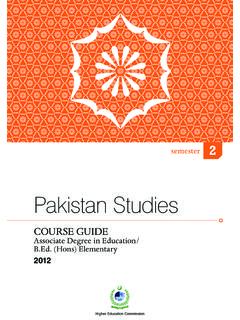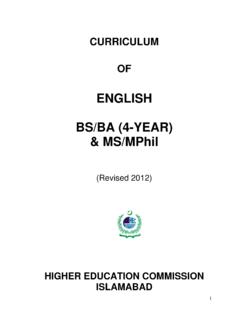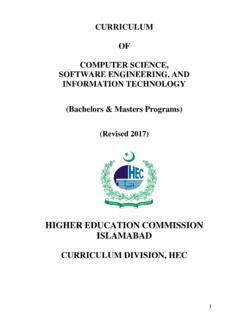Transcription of Functional English - I - HEC
1 Functional English - ICOURSE GUIDEA ssociate Degree in (Hons) Elementary2012semester 1 This product has been made possible by the support of the American People through the United States Agency forInternational Development (USAID). The contents of this report are the sole responsibility of the authors, and do not necessarily reflect the views of USAID or the United States Gover hnical Support: Education Development Centre (EDC); Teachers College, Columbia Univer sityASSOCIATE DEGREE IN EDUCATIONiiForewordTeacher education in Pakistan is leaping into the future. This updated Scheme of studies is the latest milestone in a journey that began in earnest in 2006 with the development of a National Curriculum, which was later augmented by the 2008 National Professional Standards for Teachers in Pakistan and the 2010 Curriculum of Education Scheme of studies .
2 With these foundations in place, the Higher Education Commission (HEC) and the USAID Teacher Education Project engaged faculty across the nation to develop detailed syllabi and course guides for the four-year (Hons) elementary and two-year Associate Degree in Education (ADE). The syllabi and course guides have been reviewed by the National Curriculum Review Committee (NCRC) and the syllabi are approved as the updated Scheme of studies for the ADE and (Hons) elementary programs. As an educator, I am especially inspired by the creativity and engagement of this updated Scheme of studies . It offers the potential for a seismic change in how we educate our teachers and ultimately our country s youngsters. Colleges and universities that use programs like these provide their students with the universally valuable tools of critical thinking, hands-on learning, and collaborative am grateful to all who have contributed to this exciting process; in particular the faculty and staff from universities, colleges, and provincial institutions who gave freely of their time and expertise for the purpose of preparing teachers with the knowledge, skills, and dispositions required for nurturing students in elementary grades.
3 Their contributions to improving the quality of basic education in Pakistan are incalculable. I would also like to thank the distinguished NCRC members, who helped further enrich the curricula by their recommendations. The generous support received from the United States Agency for International Development (USAID) enabled HEC to draw on technical assistance and subject-matter expertise of the scholars at Education Development Center, Inc., and Teachers College-Columbia University. Together, this partnership has produced a vitally important resource for Pakistan. PROF. DR. SOHAIL NAQVI,Executive Director,Higher Education Commission, N I T 1U N I T 4U N I T 5U N I T 3U N I T 6U N I T 2iiiHOW THIS COURSE GUIDE WAS DEVELOPEDHow this course guide was developedAs part of nation-wide ref or ms to improve the quality of teacher education, the Higher Education Commission (HEC) with technical assistance from the USAID Teacher Education Project engaged faculty across the nation to develop detailed syllabi and course guides for the four-y ear (Hons) elementary and two-year Associate Degree in Education (ADE).
4 The process of designing the syllabi and course guides began with a curriculum design workshop (one workshop for each subject) with faculty from univer sities and colleges and officials from provincial teacher education apex institutions. With guidance from national and international subject experts , they reviewed the HEC scheme of studies , organized course content across the semester, developed detailed unit descriptions and prepared the course syllabi. Although the course syllabi are designed primarily for Student Teachers, they are useful resource for teacher educators too. In addition, participants in the workshops developed elements of a course guide. The course guide is designed for faculty teaching the (Hons) elementary and the ADE. It provides suggestions for how to teach the content of each course and identifies potential resource materials. In designing both the syllabi and the course guides, f aculty and subject experts wer e guided by the National Professional Standards for Teachers in Pakistan 2009 and the National Curriculum 2006.
5 The subject experts for each course completed the initial drafts of syllabi and course guides. Faculty and Student Teachers started using drafts of syllabi and course guides and they provided their feedback and suggestions for improvement. Final drafts wer e reviewed and approved by the National Curriculum Review Committee (NCRC).The following faculty were involved in designing this course guide: Sardar Nasim Akhtar Khan, GCET (M) Rawalakot; Safina Rouf, GCET (F) Muzaffarabad; Humaira Abbasi, University of AJK; Shumaila Azmat, BoC Balochistan; Talat Jahan Ara, GCE Quetta; Ghulam Mustafa, GCE Uthal; Asima Idrees, Sardar Bahadur Khan Women University, Quetta; Syed Muhammad Aamir, RITE (M) Peshawar; Shehla Sheikh, Gomal University, DI Khan; Tarranum Kehkasan, RITE (F) Kohat; Uzma Dayan, IER University of Peshawar; Iazaz Ali, IER University of Peshawar; Habib Elahi Sahibzada, Hazara University, Mansehra; Maria Bint Shahid, Fatima Jinnah Women University, Rawalpindi; Sajid ul Islam, Allama Iqbal Open University, Islamabad; Sadia Mubeen, GECE (F) Hussainabad, Karachi; Muhammad Hasil Pato, GECE Mirpurkhas; Maqsood Ahmed Sahito, GECE (M) Mithi; Rasheed Channa, GECE (M) Hyderabad.
6 Syed Saleha Shah, BoC Sindh; Ayaz Ali Mughal, University of Sindh, Hyderabad; Abdul Sattar Gopang, University of Sindh, Hyderabad; Imtiaz Ahmed, University of Karachi; Dr. Mussaret A. Sheikh, Fatima Jinnah Women University, DEGREE IN EDUCATIONivU N I T 1U N I T 4U N I T 5U N I T 3U N I T 6U N I T 2 ASSOCIATE DEGREE IN EDUCATIONivSubject experts guiding course design: Dr. Hina Ashraf, AIR University, Islamabad; Dr. Graeme Cane and Shaista Bano, Aga Khan University, Centre of English Language, KarachiDate of NCRC review: 3 March 2012 NCRC Reviewers: Ms. Qaisera Sheikh, Beacon House University; Mr. Allah Noor Khan, Gomal UniversityTable of ContentsSyllabus 8 UNIT 1 Introduction 14 UNIT 2 Social interaction 35 UNIT 3 Giving and following directions 46 UNIT 4 Sharing experiences 55 UNIT 5 Types of writing 77 Syllabus English ICOURSE SYLLABUS: English I09 English IYear/semesterYear 1, Semester 1 Duration (hours)48 hours (16 weeks) Credit value3 creditsPrerequisitesNoneCourse description The purpose of this course is to develop the English -language proficiency of pro-spective elementary school teachers and to help them become confident in reading, writing, speaking, and listening to the English of teaching grammar in isolation and only at sentence level, this course is based on developing the language abilities of Student Teachers through an integrated approach that provides opportunities to develop their listening, speaking, reading, and writing skills.
7 With a focus on social interaction, the course draws specific attention to the accurate use of structures, improvement of pronunciation, and development of active vocabulary in descriptive, narrative, and instructional texts. Course outcomesAfter completing this course, Student Teachers will: have improved their listening and reading skills in English be able to communicate in written and oral English with peers and teachers rely less on their first languages and increase their use of English in formal and informal situations have a deeper understanding of correct English structures in descriptive, narra-tive, and instructional and teaching approachesThe course uses an integrated approach to language teaching that teaches all of the four language skills listening, speaking, reading, and writing in natural settings. Both Instructors and Student Teachers are encouraged to respond through pair and group work and active learning strategies, such as role play, debates, presentations, and brainstorming.
8 Instructors and Student Teachers are encouraged to use online ASSOCIATE DEGREE IN EDUCATION10resources in conjunction with the course guide and make the best use of interactive exercises on various websites. This course links learning approaches with assessment tasks to provide Student Teachers with the opportunity to accept responsibility for their own learning. Even if Student Teachers begin the course unable to communicate fluently in English , Instructors will use English as the language of instruction. Instead of switching to Urdu or other languages when there is a problem communicating to them, you will use alternative strategies, such as slowing down, repetition, asking others to explain, or using simpler and references T. K. Carver and S. Fortinos-Riggs, Conversation Book II English in Everyday Life (New York: Pearson Education Limited, 2006).J. Eastwood, Oxford Practice Grammar (Karachi: Oxford University Press, 2005).
9 J. Swan, Practical English Usage, 3rd ed. (New York: Oxford University Press, 2005).A. J. Thomson and A. V. Martinet, A Practical English Grammar (Intermediate) (New York: Oxford University Press, 1986)Allama Iqbal Open University, Compulsory English 1 (Code 1423) (Islamabad: AIOU Press).BBC. (2013) Learning English . Council. Learn English . Council and BBC. Learn English . software free download: 3D Grammar English . materials and other resources are attached in the resource booklet devel-oped with this guide. Grading policy Instructors use a variety of assessments in this course to assess learning. It is recom-mended that course work count toward at least 50 per cent of Student Teachers final grades. Instructors will advise which course work assignments will be graded. The remainder of the grade will be determined by mid-semester and end-of-semester SYLLABUS: English I11 UNIT 1: Introductions (3 weeks, 9 hours)This first unit will provide Student Teachers with an opportunity to interact with one another in oral and written forms.
10 It will serve to introduce them and help them develop conversations through suggesting simple words and phrases to describe people, preferences, and other conversation topics in a logical #Topics/themes1 Making introductions Making effective self and peer introductions Taking useful introductory notes 2 Expressing requests and enquiries Forming appropriate requests and enquiries Responding to enquiries Requests versus commands3 Practicing practical classroom English Using different classroom language routines and functions for effective classroom management Developing effective classroom language by following provided examples Demonstrating and practicing practical classroom language routinesSemester outlineUNIT 2: Social interaction (4 weeks, 12 hours)This unit is aimed at developing Student Teachers social interaction in English and expanding their interpersonal skills.










